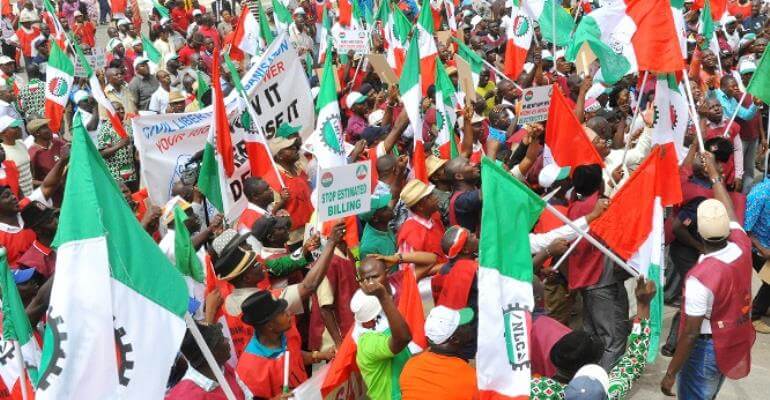The Nigeria Labour Congress has again called on the Federal Government to reverse the privatisation of the power sector due to non-performance by operators in the sector.
Advertisement
The President of the Congress, Comrade Ayuba Wabba, said this on the occasion of the 2020 World Decent Work Day,
Speaking further, Wabba noted that workers who create wealth deserve a fair share of the proceeds of production and a good portion of the wealth they create.
He insisted that government must respect the terms of the recent agreement signed with Labour especially with regards to the overhauling of the nation’s refineries.
Wabba explained that the commanding heights of the economy must be managed by government in the interest of the majority of citizens
Advertisement
He said, “We call on the Nigerian government to respect Chapter Two of the Constitution of the Federal Republic of Nigeria which demands that the commanding heights of our economy must not be left in a few hands but must be managed by government in the interest of the majority of citizens.
“It is on this note that we insist that government must respect the terms of the recent agreement signed with labour especially with regards to the overhauling of our national refineries.
“We also demand the reversal of the failed privatization of our power sector. We insist that Government has business in business”.
In seeking a lasting and fundamental approach to dealing with the workplace dislocations occasioned by the Covid-19 pandemic, he said the Congress is demanding for a New Social Contract anchored on shared prosperity and social justice.
He said that promoting a New Social Contract anchored on shared prosperity and social justice is critical to charting the path to recovery from the effects COVID-19.
Advertisement
“In order to withstand further shocks from the resurgence of fresh outbreaks of Covid-19 and or other health and socio-economic dislocations, we must design a recovery plan that rebuilds the social contract between government and societies and hosted on the foundations of resilience.
“In order to achieve this, we must ensure that decent work is at the centre of government actions to bring back economic growth and build a new global economy that puts people and the planet first,” he added.
Wabba stressed on the need for government to develop recovery and resilience plans which prioritizes jobs, secured employment, workplace rights, income protection, and minimum living wages among others.
According to him, in pursuit of a New Social Contract that guarantees Decent Work, there is also need for the universal right to freedom of association and collective bargaining, provisions for safe workplaces in tandem with global best practices, equality and inclusion especially through equal economic participation of women, all racial groups.
He said, “The current global economic model is flawed as it has entrenched inequality and insecurity for working people and their families both in Nigeria and other parts of the world.
“In order to promote inclusion and reduce the inequality gap, we call for adequately funded universal public health, education and care.
Advertisement
“We also demand that Just Transitions for climate and technology should be central in economic planning and policy framing.
“In order to create the enabling broader environment for the sustenance of these fundamental rights at work, we also call for a rejig of the world economic system.”
Wabba explained that the impact of the Covid-19 pandemic and the attendant risks to economies and societies are very palpable, exposing the inadequacies of the current flawed economic model of globalization occasioned by wealth accumulation and lack of social justice.
He added, “What we have is today! And today is World Decent Work Day. This gives us the ample opportunity to speak to the issues and workplace challenges that have been thrown up by the Covid-19 crisis and the other social dislocations that preceded the pandemic.
“Hundreds of millions of livelihoods sustained by the informal sector have been wiped off, deepening an already broken narrative of vulnerability and despondency among workers who earn their living on day to day basis”.
“In Nigeria, Covid-19 only compounded the frail shape of an already existing fragility in our industrial space and associated social support system.
“We also reached out to the employers in the private sector through the auspices of the Nigeria Employers Consultative Association. The fruit of that strategic engagement was the signing of a Memorandum of Understanding for job protection”.
The Labour Leader said that the House of Representatives, in order to create an enabling environment for businesses to recover, has put together an Emergency Economic Stimulus Bill 2020.
He said the bill seeks to protect the employment status of Nigerians by providing tax breaks to employers who do not lay off employees during the prevalence of the novel corona disease in Nigeria.



